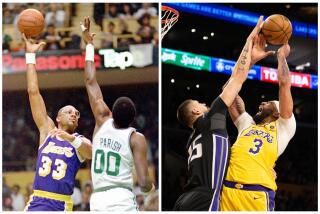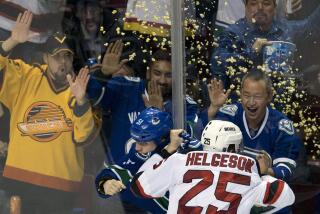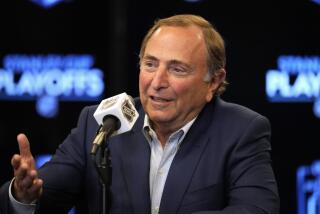McSorley Keeping an Edge While Awaiting His Hearing
- Share via
He stands in the corner of the Lakewood rink, which has a few wooden seats on one side, a wall with a locker room door on the other, and clear plastic curtains to keep in the cold.
It’s a long way from the NHL.
Wearing Boston Bruin pants and helmet and an Ice Dog sweater, all taken from an Edmonton Oiler bag, Marty McSorley centers pucks for Long Beach’s Ralph Barahora on a Tuesday morning, giving him an idea of how it was.
McSorley would rather show him how it is.
“I always want to play,” says McSorley, who is working out with the Ice Dogs of the West Coast Hockey League because it’s a cheap way to get ice time and he gets to work with players, which beats skating alone.
And because it allows him to get in shape for The Call.
“I’m not looking to go somewhere at 37 and just watch kids,” he says. “I’d like to play with a team that wants to win.”
First, though, there is a small matter of dealing with NHL Commissioner Gary Bettman. He suspended McSorley for the final 23 games of last season after McSorley--then a Bruin--hit Vancouver’s Donald Brashear in the head with a stick in the waning moments of a game Feb. 8. The commissioner also said that McSorley would have to ask him for reinstatement.
The clear indication was that the NHL would prefer the whole matter just go away with the retirement of a 37-year-old defenseman. But McSorley has asked for a hearing and his request has been granted, but neither side will say when and where it will take place. Their desire is to escape media scrutiny, though they could hold it in Times Square this week and no one would notice, unless McSorley showed up wearing a Met cap and Bettman came in one from the Yankees.
Until then, McSorley stands convicted in the court of public opinion, as well as one in Vancouver that sentenced him to 18 months’ probation for assault with a weapon.
“Unfortunately, as much as I would like to talk about it. . . . I don’t want anybody to get upset for any small little reason, so I’m not going to address it at this time,” he says, not giving the league any more ammunition.
He and Bettman still haven’t spoken about the incident. The league’s hearing before the suspension was held with McSorley absent after his attorney was denied a two-day delay.
McSorley was told to stay away, then to not say anything because of his pending criminal trial.
His first take on the incident came during the weeklong Vancouver trial.
“People think that I’ve been through so much,” McSorley says now. “I have no problem about what I intended to do.
“I stand by what I said after the game. I felt extremely bad for what happened, really bad. People say, ‘take responsibility.’ I’ve taken responsibility for what happened. But what people don’t understand is that I went out to fight Donald Brashear. I think that if you read the evidence closely and don’t just take sound bytes, it really points to the fact that I went out there to do just that.”
The game was in its waning seconds when he was sent onto the ice to find Brashear, whom he had fought earlier and who had taunted the Bruin bench during the game, which the Canucks won easily. As an enforcer, with 3,381 NHL penalty minutes, that was what McSorley was hired to do.
“I think the people who know hockey know what happened,” McSorley says. “There are a lot of people who think that hockey is too violent, period. The media had headlines ‘Hockey’s on Trial’ and the ‘Violence in Hockey’s on Trial’ going into the trial. I wanted the trial to be focused on an accident and just leave it at that.”
To that end, he turned down requests from active and former players to testify on his behalf, to give the court an idea of a culture that has grown up in the sport.
McSorley’s contention is that he intended to hit Brashear on the shoulder to provoke him and that the stick glanced from the shoulder to Brashear’s head, felling him.
“I was just shocked that it happened,” he says. “I had done things like that so many times. We play at such a high level, at such a cutting-edge environment, that things go on all the time. It just seemed like everything went wrong.”
What followed shouldn’t have been a surprise.
“I expected to get suspended.” he says. “I expected it to be addressed. I was really, really surprised by the life it took.”
That life was fed by repeated showing of videotape of the incident, which ends with Brashear’s head bouncing on the ice.
He suffered a concussion.
Perhaps ironically, Brashear scored on the night of the verdict.
“I’ve heard that I was extremely angry when I hit him,” says McSorley. “There’s no evidence of that. No, not at all. I’m no angel. I’ve had a lot of fights over my career. I’m not going to be a hypocrite and say there should be no fighting or things like that. I was fully conscious that the last thing I ever do in the NHL is get into a fight.”
Why not? It was the first thing.
“I fought in my first game, just to keep playing, just to stay in the lineup,” he says. “The fact is that I went out to get into a fight that I thought was necessary for our hockey team. Do I have a problem with that? I don’t like what happened. I wouldn’t want anybody to do it to me. I don’t think there’s a place in the game for it.”
The question now is whether there is a place for McSorley.
A Vancouver court has judged him. So has public opinion, in part fed by pundits. So has Bettman, who now gets to revisit the case, like it or not.
People who say McSorley should be banned “have to sit down and look at all the evidence, look at the position I was in and answer that question honestly,” he says. “They have to look at the game, not only the game I was in, but the game as a whole.
“It was an ugly incident to see. I don’t enjoy watching [the videotape] myself. I don’t like to see it in the game. But you can’t think that the game’s going to go on and there are not going to be accidents. How many hockey players have all their teeth and how many of them haven’t been cut in the face?”
The answer is few.
A scar alongside Marty McSorley’s mouth shows he is in the majority.
More to Read
Go beyond the scoreboard
Get the latest on L.A.'s teams in the daily Sports Report newsletter.
You may occasionally receive promotional content from the Los Angeles Times.






